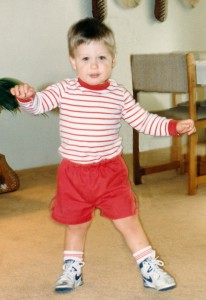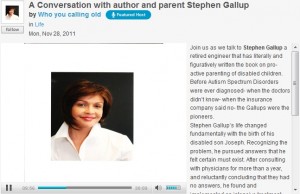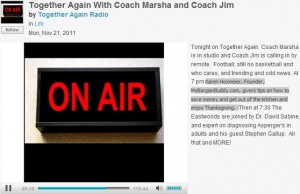
Two words for you today: Fear not. I type them in hopes that they won’t make me sound too much like the heavenly messengers who show up in Scripture. Perhaps it will help to mention that I’m also, or mainly, addressing these words to myself. I think they need to be said because of the moods I occasionally fall into while striving to attain objectives.
All too often, the hoped-for results of that striving are slow in showing up.
How do you react when you have to wait?
There are times when something in me wants to go ahead and expect the worst. Putting aside gloomy thoughts is a lesson I must continue learning, over and over again, because what tends to happen then is that, just as I begin to sound like Eeyore, an unexpected event reminds me that the final results are not yet in.
This was often true during the campaign to help my son Joseph, described in WATB. Joseph would hit a plateau and stay there until I was wild with impatience. Then, for example, long past the point when it would have occurred if I were running the show, there’d be the sweet reward of something like his first steps (at 39 months). The same pattern is also taking shape with WATB itself.
Yesterday, as I stewed over the perception that WATB has been read by only a small number of people, and might never be read by many more, such an event occurred. I received an email from novelist Ann Beattie. She has read my book, and she offered the verdict that it’s “excellent,” “vivid,” and “highly visual.” I’m sure she would not have contacted me to say that if she didn’t believe it to be true.
Of course, there’s no hard link between reassurances of literary quality and commercial success. Seems like the two ought to go hand-in-hand, but plenty of books have one without the other. Still, this is encouraging because from my point of view the former is the part that seems attainable via personal effort. The other comes (if it does) through a somewhat mysterious process that may be unfolding (at its own pace) even now.
Two more words, for you and for me: Be patient. Let’s try to avoid becoming discouraged. Let’s avoid letting despondency be a competitor for our heart. That’s an extra challenge on top of whatever we are doing to achieve our goals, but I think succeeding at it makes the rest of the process more fun.
Emotions like depression and anxiety boil down to our wanting to stay in control. Ultimately, we aren’t. If we were, everything would be to our liking, and that’s almost never the case. At least not for me.
There are times when we choose to go after something important. Many years ago, Judy and I set out to achieve quality-of-life improvements for our disabled son. More recently, I decided to preserve that experience in a memoir. Such choices must have integrity, by which I mean they should be motivated by the right intentions, guided by the best possible information, given shape by the highest quality of effort. So resolving to be patient is not abdicating responsibility to do what we can to obtain that good result. It’s just recognizing the point at which our powers end—or at which we must wait hopefully for the outcome of what we have sown.
Two more words: When we have done all we can, let go. The end result may surprise us.
 Today I enjoyed my 12th media interview concerning WATB. As occasionally happens, discussion took off in unexpected directions, so that I failed to make certain points that had felt important when starting out. On the other hand, these conversations have all been good experiences and have certainly kept me on my toes. Please click here for the audio. Excerpt below:
Today I enjoyed my 12th media interview concerning WATB. As occasionally happens, discussion took off in unexpected directions, so that I failed to make certain points that had felt important when starting out. On the other hand, these conversations have all been good experiences and have certainly kept me on my toes. Please click here for the audio. Excerpt below:
